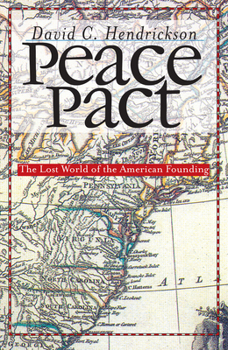Peace Pact: The Lost World of the American Founding
(Part of the American Political Thought Series)
Select Format
Select Condition 
Book Overview
That New England might invade Virginia is inconceivable today. But interstate rivalries and the possibility of intersectional war loomed large in the thinking of the Framers who convened in Philadelphia in 1787 to put on paper the ideas that would bind the federal union together. At the end of the Constitutional Convention, Benjamin Franklin rejoiced that the document would "astonish our enemies, who are waiting to hear with confidence . . . that our States are on the point of separation, only to meet hereafter for the purpose of cutting one another's throats." Usually dismissed as hyperbole, this and similar remarks by other Founders help us to understand the core concerns that shaped their conception of the Union. By reexamining the creation of the federal system of the United States from a perspective that yokes diplomacy with constitutionalism, Hendrickson's study, according to Karl Walling, "introduces a new way to think about what is familiar to us." This ground breaking book, then, takes a fresh look at the formative years of American constitutionalism and diplomacy. It tells the story of how thirteen colonies became independent states and found themselves grappling with the classic problems of international cooperation, and it explores the intellectual milieu within which that problem was considered. The founding generation, Hendrickson argues, developed a sophisticated science of international politics relevant both to the construction of their own union and to the foreign relations of "the several states in the union of the empire." The centrality of this discourse, he contends, must severely qualify conventional depictions of early American political thought as simply "liberal" or "republican." Hendrickson also takes issue with conventional accounts of early American foreign policy as "unilateralist" or "isolationist" and insists that the founding generation belonged to and made distinguished contributions to the constitutional tradition in diplomacy, the antecedent of twentieth-century internationalism. He describes an American system of states riven by deep sectional animosities and powerful loyalties to colonies and states (often themselves described as "nations") and explains why in such a milieu the creation of a durable union often appeared to be a quixotic enterprise. The book culminates in a consideration of the making of the federal Constitution, here styled as a peace pact or experiment in international cooperation. Peace Pact is an important book that promises to revolutionize our understanding of the era of revolution and constitution-making. Written in a lucid and accessible style, the book is an excellent introduction to the American founding and its larger significance in American and world history.
Format:Paperback
Language:English
ISBN:0700614931
ISBN13:9780700614936
Release Date:April 2003
Publisher:University Press of Kansas
Length:416 Pages
Weight:7.40 lbs.
Dimensions:0.9" x 6.1" x 9.4"
Customer Reviews
1 rating
The Grotian constitution
Published by Thriftbooks.com User , 17 years ago
For anyone who reads constitutional history it becomes apparent after a while that the constitution is all things to all scholars. Much of the insight that any new contextualization of the constitution offers to the reader depends on the background reading and expertise of the author. David C. Hendrickson has read deeply in the theorists of international law that were influential in the founding period. Anyone who has read Madison, Jefferson, Wilson, Adams, etc.. knows the names of Pufendorf, Vattel and Grotius among others. They were the most influential writers on international law as well as important thinkers on natural law. Hendrickson wants to place the understanding of the founding within that context of the thinking on international and natural law of the period. His basic thesis is that the Constitution more than anything else was a peace pact between the different sections of the country. What the founders were working to avoid were the twin spectors of international anarchy and universal empire. International anarchy as in the war of every state or region against all or universal empire as in one of the European powers managing to ally themselves with one region and then coming to dominate it and all other regions. Or the seperate sections of the country aligning themselves with different European powers and thus becoming just another stage for the contest for dominance of those powers. It is hard for us to imagine this now but it wasn't really until after the War of 1812 that the existence of this country was taken as a given by those powers. And while the Anti-Federalist railed hard against this point, one of the telling arguments for the Federalists during the ratification debates was that the "imbecility" of the government threatened us with dismemberment or absorption (as any close reader of the Federalist will attest). Hendrickson feels that the men who created the constitution did so using what he calls the unionist paradigm. He wants us to see the national government created by the constituion as a system of states that came together to form a "federative" system. There were enumerated (or specific) powers for both the national government and those of the states. Both would act on individuals within their respective spheres. So far this sounds a lot like some of the compact theories of the constitution that were popular in the early national period but Hendrickson feels that as a peace pact between regions it would be understood that individuals states or regions could not break from the union without expecting consequences. One of the points that Hendrickson makes which is too little emphasized in the literature on the Constitution is that the Founders did not argue out all issues. They basically left many of the basic issue of governance (such as precisely what was meant by phrases such as "necessary and proper")to be hashed out by the early members of Congress and the President. They realized that to try to settle all of the





